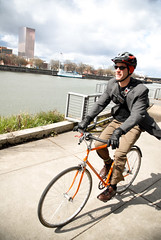A Portland blog that covers “gentrification and other problems” has published an article about “bike commuters” that I found interesting and wanted to share.
It also brought up some thoughts of mine on how people tend to lump “bike commuters” into one big, happy group.
In Seeing The Sky; And, The Privilege Of Bike Commuting, the blog’s author shares the “unfortunate truth” that bike commuting is “a privilege, mostly denied to the middle working class (my error)” (emphasis mine):
“Commuting by bike has everything to do with the economic freedom and mobility of a class that can determine where work and home are located, and how permanently. That it is in many ways a privilege, mostly denied to the working class, is too rarely admitted.
To change how people get to work from where they live, without seeing that we need massive changes in what work people can do and where they can manage to live, is in my view folly in the truest sense of the word.”
The thoughts above were inspired by a comment on Bojack — a Portland blog that is usually cynical toward bike-related stories and is outright critical of Transportation Commissioner Sam Adams. That comment put it this way:
“Commuting by bike is an extremely privileged opportunity available to a very few who most likely have no families (kids), no tools of a trade (Laptop at most?), no appointments to make outside of a mile radius, no shopping on a realistic scale, no emergencies, no extended family or friends to care for for, no volunteering duties that require expediency or supplies, etc., etc., etc. What an insult to the very people who have made this city such an attractive place to live, to come here and change the status quo to meet their narrow-minded, self-serving agendas.”
I’m curious how many Portlanders share those feelings.
The unfortunate thing about both of these characterizations is that they assume some sort of homogeneity among “bike commuters”. This is a perception that is simply incorrect, yet I think it persists among a significant portion of our population.
The truth is that people who choose to bike are not somehow transformed once they straddle a top tube.
To answer that second comment above: I have a family (two kids under six), I always ride with expensive computer and camera equipment and I ride about 10 miles a day to get to my office, cover stories, and meet people all over the metro area. As for shopping on a “realistic scale”, emergencies, family, and other things that “require expediency”, I just hop in my mini-van.
Yes. I am a “bike commuter”, a bike activist, a professional bike journalist, part of the bike lobby — whatever you want to call me. And yes, I own and sometimes drive a mini-van.
I hope the Portlanders who don’t ride, have anxieties about those that do, or have mixed-feelings about the bike-friendly direction our city is headed, stop and realize that people on bikes are just people. They’re not all part of some club or some homogeneous set of beliefs
Hipsters, moms, punks, dentists, factory workers, entrepreneurs, lawyers, students, senior citizens, day laborers, grandmas, politicians, Republicans, Democrats, hippies, hunters, and so on. It’s a list of Portlanders — some bike, some drive cars, most do both, some do neither.
When I ride, I am not a bicyclist, I am a person on a bike.
Our city will be a much nicer place to live and to move around when we stop trying to define others simply by their chosen mode of travel.
===
I know many BikePortland readers defy these stereotypes, I would love to hear your story (and ultimately hope people from those other blogs will read them too).
Also, I wrote this story to not only refute these characterizations, but to remind bike advocates and activists that there are a lot of Portlanders who don’t see everything through bike-colored glasses — and if we really want to create a city where more of them consider biking as an option, we must understand (and address) their perspectives and opinions.


